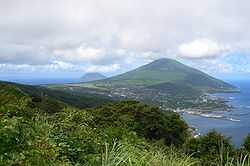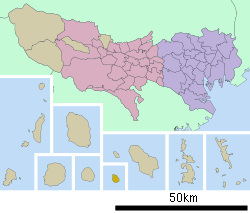Aogashima, Tokyo
| Aogashima 青ヶ島村 | ||
|---|---|---|
| Village | ||
 | ||
| ||
 Location of Aogashima in Tokyo Metropolis | ||
 Aogashima
| ||
| Coordinates: 32°27′48″N 139°45′59″E / 32.46333°N 139.76639°ECoordinates: 32°27′48″N 139°45′59″E / 32.46333°N 139.76639°E | ||
| Country | Japan | |
| Region | Kantō | |
| Prefecture | Tokyo Metropolis | |
| District | Hachijō Subprefecture | |
| Area | ||
| • Total | 5.98 km2 (2.31 sq mi) | |
| Population (March 2011) | ||
| • Total | 206 | |
| • Density | 34.3/km2 (89/sq mi) | |
| Time zone | Japan Standard Time (UTC+9) | |
| - Tree | Persea | |
| - Flower | Lilium | |
| - Bird | Japanese wood pigeon | |
| Phone number | 04996-9-0111 | |
| Address | Aogashima-mura, Mubanchi 100-1701 | |
| Website | Aogashima Village | |
Aogashima (青ヶ島村 Aogashima-mura ) is a village located in Hachijō Subprefecture, Tokyo Metropolis, Japan.
Geography
Aogashima Village covers the island of Aogashima, the southernmost and most isolated populated island in the Izu archipelago in the Philippine Sea, 358.4 kilometres (222.7 mi) south of central Tokyo, and 71.4 kilometres (44.4 mi) south of Hachijōjima, its nearest populated neighbor. Aogashima is the least populous municipality in the whole of Japan. Warmed by the Kuroshio Current, the town has a warmer and wetter climate than central Tokyo.
Neighboring municipalities
History
It is uncertain when human settlement first began on Aogashima, but the island was known to be inhabited in the early Edo period, and is mentioned in historical records kept by the Tokugawa shogunate in Hachijōjima. During a major volcanic eruption in 1785, a large number of islanders perished, and the remainder were evacuated to Hachijōjima. An 1835 census reported 241 inhabitants (133 men, 108 women), mostly engaged in fishing.
On April 1, 1940, the island came under the administrative jurisdiction of Hachijō Subprefecture. The population is centered on two hamlets; Yasundogō (休戸郷) in the east and Nishigō (西郷) in the west.
Economy
Fishing and subsistence agriculture are the mainstays of the economy of Aogashima, with a small number of tourists and sports fishermen providing seasonal income.
Transportation
Due to its lack of natural harbors and strong currents, Aogashima has always been difficult to access. The wharf at the island’s only port, Sanbō, can handle small ships of up to 500 tons, and is unusable during times of high waves and inclement weather. Toho Air also provides chartered helicopter service to the island from Hachijōjima.
Education
Because Aogashima has a small population, there is one school that is available to elementary and junior high school students. Aogashima Elementary-Junior High School (青ヶ島村立青ヶ島小中学校) serves student populations.
Gallery
-

Aerial view of the island
-

Port of Sanpō, the only port in the island
External links
| Wikimedia Commons has media related to Aogashima, Tokyo. |
| ||||||||||||||||||||||||||
